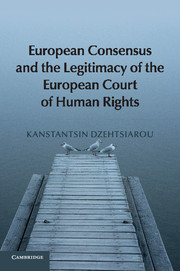Crossref Citations
This Book has been
cited by the following publications. This list is generated based on data provided by Crossref.
2015.
BOOKS RECEIVED.
The Cambridge Law Journal,
Vol. 74,
Issue. 3,
p.
643.
Tzevelekos, Vassilis P.
2016.
International Custom Making and the ECtHR's European Consensus Method of Interpretation.
SSRN Electronic Journal,
Ragone, Sabrina
and
Volpe, Valentina
2016.
An Emerging Right to a “Gay” Family Life? The CaseOliari v. Italyin a Comparative Perspective.
German Law Journal,
Vol. 17,
Issue. 3,
p.
451.
Donnelly, Michael P.
2016.
The Human Right of Home Education.
Journal of School Choice,
Vol. 10,
Issue. 3,
p.
283.
D’Amico, Marilisa
and
Nardocci, Costanza
2016.
LGBT rights and the way forward: the evolution of the case law of the ECtHR in relation to transgender individuals’ identity.
ERA Forum,
Vol. 17,
Issue. 2,
p.
191.
Poppelwell-Scevak, Claire
2016.
The European Court of Human Rights and Same-Sex Marriage. The Consensus Approach.
SSRN Electronic Journal,
Medda-Windischer, Roberta
2017.
Militant or pluralist secularism? The European Court of Human Rights facing religious diversity.
Religion, State and Society,
Vol. 45,
Issue. 3-4,
p.
216.
Follesdal, Andreas
2017.
Moral and Political Conceptions of Human Rights.
p.
77.
Landfried, Christine
2017.
Demokratie, Diktatur, Gerechtigkeit.
p.
371.
Mihelčić, Gabrijela
and
Marochini-Zrinski, Maša
2018.
The impact of the ECTHR interpretative methods and principles on selected civil law institutes.
Zbornik radova Pravnog fakulteta Nis,
Vol. 57,
Issue. 78,
p.
127.
Fenwick, Helen M.
2018.
The Rule of Crisis.
Vol. 64,
Issue. ,
p.
121.
Peat, Daniel
2019.
Comparative Reasoning in International Courts and Tribunals.
KARVATSKA, SVITLANA
2019.
The European Court of Human Rights Interptetation of Migrants Cases: Basic Doctrinal Approaches.
Право України,
p.
132.
de Londras, Fiona
2019.
Building Consensus on European Consensus.
p.
311.
2019.
Comparative Reasoning in International Courts and Tribunals.
p.
1.
Kleinlein, Thomas
2019.
THE PROCEDURAL APPROACH OF THE EUROPEAN COURT OF HUMAN RIGHTS: BETWEEN SUBSIDIARITY AND DYNAMIC EVOLUTION.
International and Comparative Law Quarterly,
Vol. 68,
Issue. 1,
p.
91.
Bal, Ali
2019.
AVRUPA İNSAN HAKLARI MAHKEMESİNİN AVRUPA KONSENSÜSÜNE BAŞVURMASI.
Dokuz Eylül Üniversitesi Hukuk Fakültesi Dergisi,
Margaria, Alice
2019.
The Construction of Fatherhood.
Mahoney, Paul
2019.
The Art of Judicial Reasoning.
p.
105.
Morano-Foadi, Sonia
and
Andreadakis, Stelios
2020.
Protection of Fundamental Rights in Europe.
p.
85.





